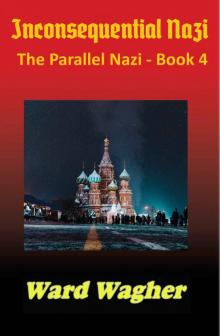- Home
- Ward Wagher
Inconsequential Nazi Page 2
Inconsequential Nazi Read online
Page 2
CHAPTER TWO
December 4, 1942, 2 PM
Governing Council Chamber
Reich Chancellery
Berlin, Germany
“I had hoped to get together with you earlier than this,” Schloss began, “but everyone has been busy putting things into motion to deal with the current crisis. We will not meet for long, meine Herren, but I need to get a feel for things. Karl, perhaps you could start with a summary of the events and what you know at this point.”
Rainer nodded and spoke. “Of course, Herr Reich Chancellor. I sent Colonel Meisterlich to arrest the Gauleiter of the Alsace. As we have discussed, his level of brutality to the people of that state was appalling. It appears that Herr Wagner was told we were coming and had armed retainers in place to defend him. The colonel and his men were all killed.”
“How many people did he have with him, Karl?” the Foreign Minister asked. Peter Scheiber was listening carefully and taking notes.
“Twenty-four men, plus the colonel,” Rainer replied. “As I understand it, Wagner had people in place to ambush them outside of the headquarters in Strasbourg.”
“I have a Wehrmacht division on its way,” Goering interjected. “And the Luftwaffe has been flying reconnaissance over the area.”
“Were the aircraft fired upon?” Schloss asked.
“No, Herr Reich Chancellor. It seems to be very quiet in Strasbourg.”
Schloss looked around the room. It had changed little since Hitler had used it as his primary meeting room. It still seemed composed of dark draperies and darker wood. Over the past eighteen months, it had gradually become known as the Government Council Chamber. Schloss thought the name fit and had no objections to anyone calling it that. He thought that the room had witnessed a lot over the past year.
“Karl, you apparently have other resources in Strasbourg. Have you heard anything further?”
Rainer shook his head. “We think Wagner’s people have taken over the phone exchanges. We cannot call without giving an operator the number of our people. Wagner would scoop them up immediately.”
“But you got some information early on,” Schloss persisted.
“Yes, we did. But, the head of our communications section told them to stay off the phone. We are developing other ways to communicate.”
“That is probably wise,” Schloss murmured. “Does anyone else have further information?” He looked around the table.
“Ribbentrop shook his head. He seemed a bit bewildered by the events. Gehlen raised a finger.
“Yes, Colonel?”
“I had a report work its way through my string of agents in England. It was clearly intended for MI6. I have one man in the group who I think is loyal to the Fatherland. I am also convinced the rest of the group is hopelessly compromised. The gist of the message was that the Gauleiter was splitting Alsace and Lorraine off from the Reich. He was asking for help from the English and claimed he had an opportunity to tear France away from us.”
Goering stared at him. He then swung his head to look at Schloss. “Mein Gott, Herr Reich Chancellor. If Wagner can accomplish even a fraction of that, we are in serious trouble.”
“We are already in serious trouble, Hermann,” Schloss said. “Reinhard, do whatever you can to validate that message. Hermann, tell me about the Wehrmacht response.”
“General Von Rundstedt got a division on the road within a couple of hours. They will get to the border of Alsace in 48 hours or so. At my suggestion, he has pushed another four divisions out of the kasernes and pointed them to the border. If the lead division runs into anything it can’t handle, they should have sufficient reinforcements.”
“Rundstedt was thinking,” Schloss commented.
“I agree,” Goering said. “Guderian was smart to keep Von Rundstedt in his position. The man is very good at what he does.”
“Does anyone have anything further?”
“A side conversation, Herr Reich Chancellor?” von Ribbentrop said.
Goering scowled and looked disgusted.
“Very well, Joachim, please come to my office after we adjourn. I want everyone to stay on top of things. Please keep me informed.”
Schloss stood and walked quickly back to his office. Ribbentrop stood but looked unsure. Willem Kirche snapped his binder shut and got out of his chair. He walked over to Ribbentrop.
“Herr Commerce Minister, you can go on over to the Reich Chancellor’s office.”
“Very well. Thank you,” Ribbentrop said.
Ribbentrop followed Schloss into the palatial Reich Chancellor’s office. Schloss tossed his notebook and pencil onto the desk and motioned the other man to a chair. As Schloss slipped into his chair, Kirche marched into the room with a fresh decanter of coffee.
“Some coffee, Gentlemen?”
“I thought you’d never ask,” Schloss replied. He glanced over at Ribbentrop. “How about you Joachim?”
“I believe a cup would taste very good. It’s a chilly afternoon outside, and I haven’t quite gotten warmed up again.”
Kirche busily poured coffee into the two cups on the tray and served the men. Schloss took a noisy slurp of the hot coffee and sighed.
“That is just what I needed, Willem. Thanks.”
“You are welcome, Herr Reich Chancellor.”
Ribbentrop nodded his thanks as the secretary retreated from the room.
“I don’t know how you manage to find people like that, Herr Schloss.”
Schloss grinned at Ribbentrop. “Actually, Karl finds them for me. The man has an absolute gift for finding good people.”
“Maybe I should talk to him, then. I think the only time the people in my office appear to do any work is when I am walking through.”
“That bad?”
“When Frick ran the office, I do not believe he accomplished anything of significance,” Ribbentrop commented. “And his office reflected his desires, I think.”
“What would you like to do?”
“I would like to sack the lot of them and start over.”
Schloss rolled his tongue around in his cheek as he thought about what Ribbentrop had just said. In Schloss’s alternate world, Frick was actually the Minister of the Interior, rather than Minister of Economics. In both worlds, however, Frick was just as disagreeable. However, in the current place, Frick was also well known for being an incompetent administrator. When Schloss had appointed Ribbentrop to Commerce, Frick had resigned in a huff and Schloss had quickly accepted the resignation. The man was now out of the government, which suited everyone concerned.
“Joachim, this portfolio is your responsibility. If you can sweep a wide broom without totally disrupting your operations, I won’t complain. You have the authority.”
“Thank you, Herr Reich Chancellor,” Ribbentrop replied.
“Was that what you needed to see me about?”
“No, actually. It just occurred to me when Kirche was in here. I believe I will speak with the Reichsprotektor about finding some capable people. I will wait until I have some lined up before I burn my bridges.”
Schloss chuckled. “Very wise.”
“Yes, well, I wanted to talk about our raw material purchases from Russia.”
Schloss nodded. “Go ahead. You have my attention. Whenever the Russians are mentioned, I begin to get nervous.”
“As well you should, Herr Schloss. As you know, we have been buying large quantities of oil, nickel, rubber, and manganese, among other things.”
“And food stocks, as well,” Schloss added.
“Correct. We are supplying the Russians manufactured goods along with coal. Also steel tubing.”
“So, it has been mutually profitable.”
Ribbentrop shrugged. “As you mentioned one time, by purchasing raw materials and selling them our manufactured goods, we are essentially making them into our colony. I have been working to encourage those kinds of activities. Russia is largely agrarian, and their manufacturing infrastructure is primitive.”
“Very true. And it gives us the resources we need.”
“Ah, yes. And I believe that the trade works like a drug for the Russians. The manufactured products we sell to them are vastly better than what they can make themselves. I believe they will succumb to the temptation to just buy our products and continue to pay with raw materials. It helps them in the short run, and helps us overall.”
Schloss picked up his pencil and tapped first one end and then the other on his desk. “Okay, I think I accept your analysis. So what’s the problem?”
“The flow of raw materials out of Russia has slowed down,” Ribbentrop explained. “They claim logistical difficulties.”
“Is that true?”
“The Russian railroads are not in very good shape, but they have always seemed to have run them reasonably well. No, Sir, I suspect they are deliberately trying to slow down deliveries.”
“I don’t think I like where this is going.”
Ribbentrop stared at Schloss for a few moments, and then visibly shook himself.
“I am sorry, Herr Reich Chancellor. I was thinking too narrowly. Do you believe Stalin is getting ready to attack?”
“I worry about that,” Schloss replied. “Gehlen reports that Stalin’s economy is starting to fall apart. He attributes this to all of the people Stalin has purged. In the communist system, the most productive and creative people are the ones who may pose the greatest threat to the regime. Stalin’s latest round of purges may have involved hundreds of thousands of people.” And you’d better be careful what you say, Hennie, he is going to ask you how you know that, and I don’t have a good answer.
“His economy is falling apart and he is getting ready to start a war?” Ribbentrop looked disbelieving.
“I have to be careful here, Joachim. I am concerned that with his economy going into the toilet, Stalin may start a war to appeal to the patriotism of the people. I really can’t say what is going on in his mind, but that possibility concerns me.”
“If it concerns you, Herr Reich Chancellor, then I would be wise to worry about it.”
“How goes the trade, otherwise?”
“We are actually running out of places to store the oil.”
“Have you thought about pumping it into some caverns somewhere, or maybe some abandoned coal mines?”
Ribbentrop looked surprised. “I don’t know where you come up with those ideas, but that is intriguing. I shall have someone look into it.”
“Preferably not someone from your current office staff,” Schloss said dryly.
Ribbentrop laughed loudly. It took a minute or so for him to regain his composure. “I apologize for the outburst, Herr Reich Chancellor. I did not expect you to say something like that.”
Schloss smiled. “Just wanted to keep you on your toes. Anyway, we must look for these unexpected solutions to our problems. I imagine we really cannot afford to keep building oil storage tanks. Perhaps we could slow down our transport of manufactured goods to Moscow. Have you talked to the Americans about trade?”
“I think the Americans will buy all the machine tools we can sell them.”
“What about weaponry?” Schloss asked.
“We are in discussions about light weapons – rifles and the like, although, the Americans have produced a lot of light weapons for their populace. They have rapidly shifted over to military contracts. They have however, approached me about licensing our jet engines.”
Schloss leaned back in surprise. “I’m surprised they know enough about them to discuss this.”
“I wasn’t sure how to reply. I thought I should talk to you first,” Ribbentrop said.
“I need to think about this, Joachim. And, we need to bring Goering in on it. As you know, we are negotiating a license to build the American Boeing bomber in Germany. And I think, if we end up toe to toe with Stalin, we will need those bombers.”
“And they will want our new U-Boats as well.”
“That, too,” Schloss said. “I think we need to put this on the agenda for the next council meeting. We haven’t had a good argument for a while.”
“Are we going to get Alsace settled down?” Ribbentrop asked.
“I very much hope so,” Schloss sighed. “The thing that worries me is not Wagner. I think we’ll take care of that problem in short order. It’s the next fool who will think he is smarter than Wagner and thinks he could pull it off.”
Ribbentrop bit his lip. “I see what you mean. Very well, I appreciate your time, Herr Reich Chancellor.”
“Thank you for bringing these items to me, Herr Commerce Minister.”
Ribbentrop stood up. “You know, I enjoy this job much more than I ever did the Foreign Minister’s office.”
“The Americans have a saying about the square peg in the square hole,” Schloss commented.
Ribbentrop chuckled. “I think that must be true in this case.”
After the commerce minister left, Schloss poured himself another cup of coffee and sat down to think. He did not like what he was hearing about the Russians and Ribbentrop’s items of interest dovetailed with other things he was hearing. He firmly hoped Stalin was not getting ready to march through to the Atlantic. He didn’t think Stalin could beat Germany in this universe, but he also was sure that Germany could not beat Russia.
Schloss was developing a strategy that would keep Russia weak and off-balance. But he had trained as a historian, and he recognized the danger of underestimating Stalin. In his other world, Stalin had very likely killed more people than Hitler. He was a dangerous, dangerous adversary.
CHAPTER THREE
December 5, 1942, 9 AM
Chartwell
Westerham, Kent
United Kingdom
Winston Spencer Churchill marched into his dining room to receive breakfast. He had worked until 4 AM and then had a satisfactory sleep. His mind, however, was awash with ideas for reinforcing the bulwarks of the kingdom against the Nazis and the Communists. He had been forced to resign the premiership at the insistence of the queen. Yet he could not let go of his urgent compulsion to serve his country.
He had planned another quiet day of strolling around the estate and doing some painting. He loved this place and found it restful. He stepped out onto the second level patio and gazed out across the meadowlands of Kent. The morning fog had raised and the glistening dew reflected the sun. He decided once again that this land was indeed God’s jewel box. He wandered around the upper-level patio for perhaps fifteen minutes and then returned to his study.
Clementine Churchill was waiting there when he entered.
“Good morning, the great love of my life,” he exclaimed. “And it is a beautiful morning indeed.”
“I fear, Winston,” she replied, “that we will not enjoy the mornings many days hence.”
He shook his head and strode over the humidor. After selecting a cigar and clipping it, he put a match to it. The blue smoke billowed towards the ceiling of the study.
“What would you have me do, my dear?” he responded quietly.
“You no longer have an income from the government,” she said. “And your book royalties have declined precipitously. In case you had not noticed, this place costs a lot to run. Even if we released all the help, we could not afford the heat and the electricity.”
He walked around his desk and carefully sat himself down in the chair, as she remained standing in the middle of the room.
“I am as aware of this problem as you, my dear. I have made inquiries with several agents about placing Chartwell on the market. There is no remaining mortgage. We could purchase something in London and probably have enough to provide a living indefinitely.”
“I am glad you are thinking about it, husband. I love this place, but we must be practical in the current circumstances. And we must consider how we might arrive at some additional income.”
“I have been thinking about that, too,” he said softly.
She stared at him for a few moments. “Oh, Winston,
you must think I am a terrible shrew. Of course, you have been thinking about these things. I should not have doubted you. I worried that the shock of you losing your position might have put you into a depression.”
“I was shocked and discouraged about events, to be sure,” he said. “To give the queen credit, however, she did get the war stopped. And considering how much she hated the Nazis, it says something about her strength of will.”
“Will she succeed, ultimately?” she asked.
“We must hope she does,” Churchill replied. “I think Schloss is an honorable man. However, he is riding a tiger. That land is full of unreconstructed Nazis. With a little effort, someone might replace him, and then we are back to where we were before. Hopefully, it would be after we deal with the Japanese.”
“I thought you hated Schloss.”
“In this business, I do not have the luxury of hatred, My Dear. Herr Schloss is trying to clean up that incredible mess that Hitler and his henchmen caused. I fear that he will not ultimately succeed. His refusal to withdraw from Germany’s vassal states was a mistake, however.”
Clementine walked around the desk and laid her hand on his shoulder. “Since you have clearly thought about these things, I believe I will be happy to leave them in your hands, my love. I think I will go enjoy my house while we still have it.”
Churchill watched as his wife left the room and shook his head. He decided it would take a miracle to get this house sold before it impoverished them. Well, he had friends who helped him out before. Perhaps others would as well. He was in a bad odor in the government, after that disaster in Lisbon. He had clearly misread the mood of the Commons. And Queen Margaret was an unpleasant dash of cold water to his soul. She had always been temperamental. He had known her since she was a child, and she was always uncontrolled. In so many ways the death of the king and the crown princess during the London Blitz was tragic for the nation.
He dashed a bit of whiskey in a glass and filled it the rest of the way with water. After sipping on it for a while, he moved into his studio and picked up the brushes. He always thought better when daubing colors onto the canvass.

 The Mountains of Montora (The Chronicles of Montora Book 1)
The Mountains of Montora (The Chronicles of Montora Book 1) Nazi Magician: Inventor
Nazi Magician: Inventor The Last Paladin
The Last Paladin Inconsequential Nazi
Inconsequential Nazi Impossible Nazi
Impossible Nazi The Snows of Montora (The Chronicles of Montora Book 3)
The Snows of Montora (The Chronicles of Montora Book 3) The Margrave of Montora (The Chronicles of Montora Book 2)
The Margrave of Montora (The Chronicles of Montora Book 2) Gravity Rising (The Parallel Multiverse Book 2)
Gravity Rising (The Parallel Multiverse Book 2) ruBracks, Nazis, the Death of the Universe & Everything (The Parallel-Multiverse Book 1)
ruBracks, Nazis, the Death of the Universe & Everything (The Parallel-Multiverse Book 1) Improbable Nazi (Parallel Nazi Book 2)
Improbable Nazi (Parallel Nazi Book 2) Accidental Nazi
Accidental Nazi Improbable Nazi
Improbable Nazi